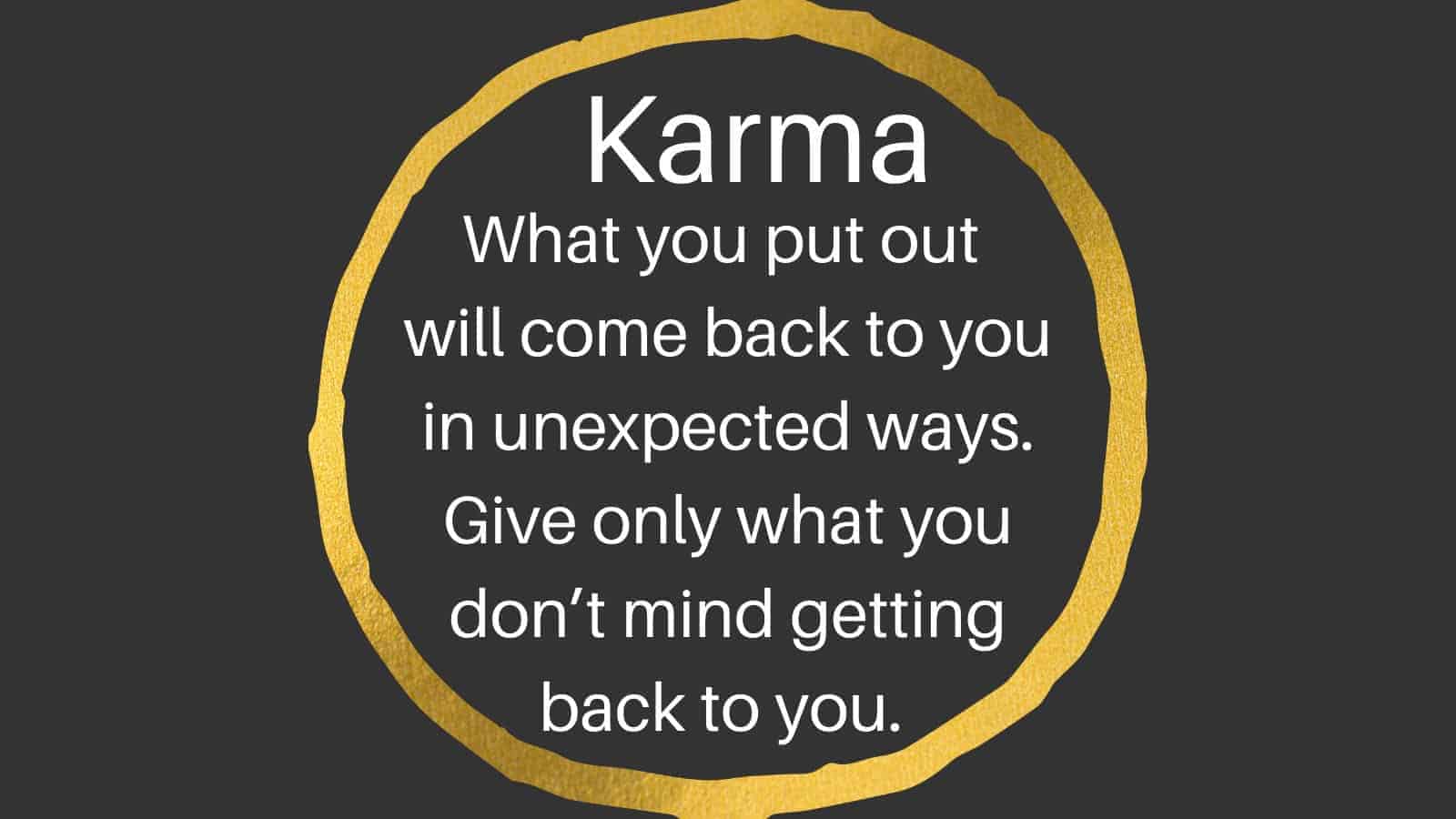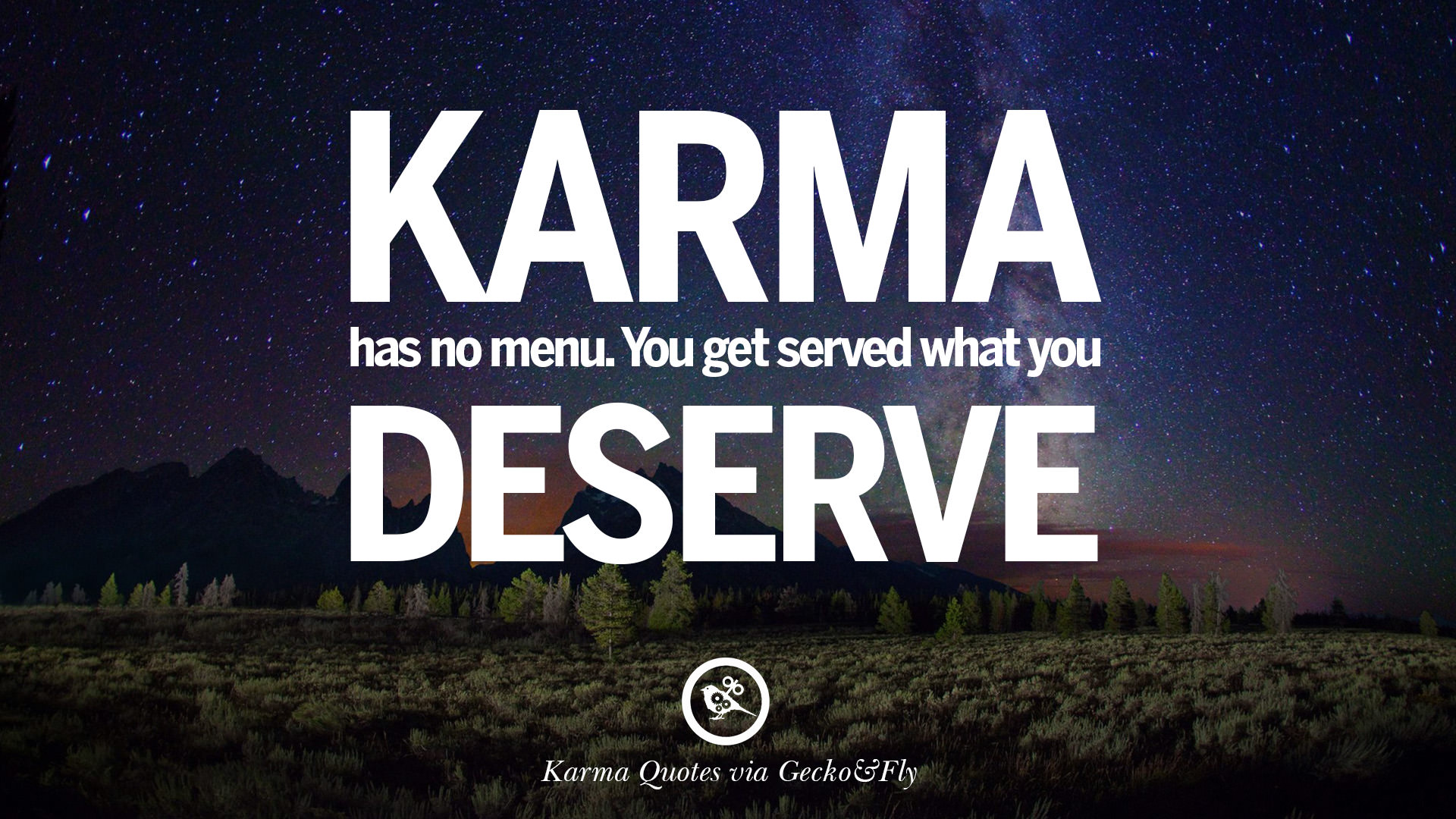Karma Sayings Explained: Understanding Life's Principles Today
Have you ever thought about how our actions might ripple out into the world, coming back to us in unexpected ways? It’s a pretty old idea, actually, one that shows up in lots of cultures and traditions. We often hear little bits of wisdom, those common "karma sayings," that capture this very thought. What do these simple phrases really mean for our lives right now, you might wonder?
For many, the concept of karma isn't just some abstract idea; it’s a way of looking at life that brings a sense of balance and accountability. It suggests that everything we do, good or not so good, sets something in motion. This idea, so it's almost, has been around for ages, shaping how people think about fairness, growth, and what happens next.
Today, with so much happening around us, these sayings about karma seem more relevant than ever. They offer a quiet reminder to consider our choices and how they might affect our journey. This article will help shed light on what karma is, the philosophy behind it, and its core principles, known as the 12 laws of karma, too it's almost.
Table of Contents
- What Karma Truly Means
- Symbols of Karma: The Endless Knot
- The Philosophy Behind Karma
- Karma Sayings in Everyday Life
- Frequently Asked Questions About Karma Sayings
What Karma Truly Means
When we talk about karma, we're really touching on a deep idea that goes beyond just simple cause and effect. It's a concept in Hinduism, Buddhism, and other traditions where a person's actions, good or bad, influence their future experiences and spiritual growth, you know. It’s a way of looking at life where what you put out tends to come back to you.
The meaning of karma is the force generated by a person's actions held in Hinduism and Buddhism to perpetuate transmigration and in its ethical consequences to determine the nature of the future. This suggests a continuous cycle, where our deeds today shape what tomorrow brings. It's a pretty powerful idea, that, when you think about it.
The Force of Actions
At its very core, karma describes the concept of getting back what you give. It’s not about some external judge or punishment; instead, it's about the natural consequences of our choices. Every action, every word, and even every thought, in a way, creates a certain energy that goes out into the world. This energy, apparently, has a way of finding its way back to us.
So, when someone talks about "good karma" or "bad karma," they're usually referring to the kind of energy generated by their actions. Acting with kindness and generosity might bring positive outcomes, while actions driven by negativity could lead to less favorable results. It's a bit like planting seeds; the kind of seeds you plant determines the harvest, you see.
Karma and Rebirth
For many traditions, karma represents the ethical dimension of the process of rebirth, known as samsara. Belief in this cycle is generally shared among the religious traditions of India. It suggests that our current life experiences are, in some respects, a result of actions from past lives, and our present actions are shaping future existences.
This idea of karma and rebirth is about continuous spiritual growth. It's not just about what happens to us in this life, but about a longer journey of the soul. The meaning of karma, in this context, is the force generated by a person's actions held in Hinduism and Buddhism to perpetuate transmigration and in its ethical consequences to determine the nature of the next life. It's a very big picture view, obviously.
Symbols of Karma: The Endless Knot
When you look around, you might notice certain designs or pictures that seem to pop up in different places, especially in Asian cultures. Karma symbols such as the endless knot are common cultural motifs in Asia. This particular symbol, the endless knot, is quite fascinating, you know.
Endless knots symbolize the interlinking of cause and effect, a karmic cycle that continues eternally. Imagine a knot that has no beginning and no end; that's what it looks like. It’s a visual way of representing how everything is connected and how our actions are part of a never-ending flow. It's pretty cool, actually, how a simple drawing can hold such a deep meaning.
The Philosophy Behind Karma
Beyond just a simple idea of getting what you give, karma is backed by a rich philosophy. It’s not just a random occurrence but a structured system of principles that govern how cause and effect play out. This philosophy helps people understand why certain things happen and how they can live a more fulfilling life, that, is that.
This article, as a matter of fact, will help shed light on what karma is, the philosophy behind it, and its core principles. It provides a framework for personal responsibility and growth, encouraging us to be mindful of our choices. It’s about understanding the deeper currents of existence and how we fit into them, so.
The 12 Laws of Karma: A Glimpse
Spirituality experts often talk about the 12 laws of karma, explaining where they come from and how to apply them for the most fulfilling life. These aren't just random rules; they are principles that help explain the mechanics of how karma works. They offer a guide for living in a way that creates positive outcomes, not just for ourselves, but for others too, right?
While we won't go into every single one here, understanding a few gives you a good idea. For instance, the Great Law says "What you put out is what you get back." Then there's the Law of Creation, which suggests we are co-creators of our lives, requiring our participation. The Law of Humility reminds us that we must accept something to change it. These laws, honestly, provide a sort of roadmap for navigating life's ups and downs.
Another one, the Law of Growth, tells us that when we change ourselves, our lives follow suit. The Law of Responsibility points out that we are responsible for what is in our life. The Law of Connection reminds us that even our smallest steps are connected to larger patterns. It's pretty clear, actually, that these laws encourage a thoughtful and intentional way of living.
There's also the Law of Focus, which highlights the importance of concentrating on one thing at a time. The Law of Giving and Hospitality talks about selfless acts. The Law of Here and Now encourages living in the present moment. These principles, you know, offer practical guidance for everyday choices and reactions.
Finally, the Law of Change says history repeats until we learn. The Law of Patience and Reward teaches that true rewards come from persistent effort. And the Law of Significance and Inspiration reminds us that our contributions, big or small, are important. Learn more about karma's deeper meaning on our site, and you can also link to this page for more spiritual insights.
Karma Sayings in Everyday Life
You hear them all the time, those little phrases that sum up the idea of karma without always saying the word itself. Things like "What goes around comes around," or "You reap what you sow." These sayings are, in a way, common sense wisdom passed down through generations. They reflect a deep human understanding that actions have consequences, more or less.
These sayings aren't just old proverbs; they're daily reminders to be thoughtful about our interactions. When you consider the idea that your kindness could inspire kindness in return, it makes you want to act with more care, doesn't it? It's a simple yet powerful idea that shapes our everyday decisions, pretty much.
Practical Wisdom for Daily Living
Applying the wisdom of karma sayings in our busy lives means taking a moment to think before we act or speak. It’s about choosing compassion over anger, generosity over selfishness, and honesty over deceit. This isn't about being perfect, but about making conscious efforts to contribute positively to the world around us, basically.
For instance, if someone cuts you off in traffic, instead of reacting with frustration, you might choose to let it go. That choice, arguably, prevents a negative cycle from starting. Or, if you see someone struggling, offering a helping hand, even a small one, can create a ripple of good. It's about understanding that our small actions, honestly, can have a big impact over time.
Living by these principles can bring a lot more peace and fulfillment. It encourages us to take responsibility for our own happiness and well-being, recognizing that it’s often tied to how we treat others. It’s a very practical way to approach life, leading to more meaningful connections and a greater sense of purpose. For further reading on the broader concept of cause and effect, you might look into philosophical texts on determinism and free will, for example, on sites like Stanford Encyclopedia of Philosophy.
Frequently Asked Questions About Karma Sayings
People often have questions about karma and what it truly means for their lives. Here are a few common ones that come up, you know.
Is karma a form of punishment?
Not really. Karma isn't typically seen as a punishment from some outside force. Instead, it's more about the natural consequences of your actions. It's like a law of nature, where what you put out, good or bad, simply returns to you. It's about learning and growth, not about being punished, you know.
Can I change my karma?
Absolutely! Since karma is about actions, you can always choose to act differently. By making positive choices, practicing kindness, and taking responsibility for your deeds, you can definitely influence your future experiences. It's about creating new, positive cycles, so.
How long does it take for karma to come back?
There's no set timeline for karma. Sometimes the effects of our actions are felt right away, and sometimes they take a while to show up. It might be in this life, or, for some traditions, in a future one. The important thing is to focus on your actions in the present, not on when the results might appear, basically.
Understanding karma sayings is about more than just reciting old phrases; it's about grasping a profound truth about how life works. It encourages us to live with greater awareness, knowing that our choices truly matter. As of November 21, 2023, the timeless wisdom of karma continues to offer a valuable guide for navigating our interconnected world. It's a concept that encourages personal growth and a deeper sense of responsibility, pretty much.

Karma Quotes: 40+ Most Powerful Karma Quotes About Life, Love and Success

Social Trends : Karma

Karma Quotes - Homecare24